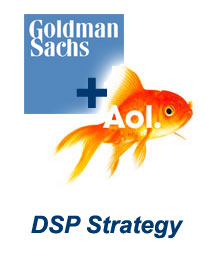 Here’s today’s AdExchanger.com news round-up… Want it by email? Sign-up here.
Here’s today’s AdExchanger.com news round-up… Want it by email? Sign-up here.
Armstrong On AOL’s Ad Desk
Aol CEO Tim Armstrong alluded to the financial markets and DSPs in a phone call with PaidContent’s David Kaplan after Aol’s recent earnings release. Armstrong described upcoming plans for Ad Desk: “And this is probably not the best analogy these days -a ‘Goldman Sachs structure,’ where the platform will sit on top of the ad exchanges and demand-side platforms to clear trades through those systems. We are testing DSP relationships right now as well so you’ll see us working on that over the next 12 months.” Read more.
MediaMind Profits
Dow Jones Newswires reports about a MediaMind regulatory filing on second quarter results showing “net income of $2.9 million on revenue of $21.2 million in the latest quarter.” Dow Jones also notes that for MediaMind’s upcoming, planned IPO, the company’s largest institutional shareholders are not selling shares. Read more.
Lawmakers Seek Privacy Policies
U.S. Congressmen Ed Markey and Joe Barton have written letters requesting more information on the privacy practices of 15 websites according to the WSJ’s Julia Angwin. She writes, “In the letters, the lawmakers asked the websites to detail their privacy practices and those of the tracking technologies installed on visitors’ computers by outside companies.” Read more.
Schmidt On Big Data
Google CEO Eric Schmidt told a Techonomy conference crowd on Wednesday to get ready for the predicative capabilities of big data. According to Read Write Web, Schmidt said, “There was 5 exabytes of information created between the dawn of civilization through 2003, but that much information is now created every 2 days, and the pace is increasing…People aren’t ready for the technology revolution that’s going to happen to them.” And that’s because prediction only becomes easier with more data. Read more.
Crowdsourcing Marketing
The New York Times featured the crowdsourcing trend and SEM/crowdsourcing marketplace, Trada. Trada CEO Niel Robertson explains to The Times, “Trada’s more than 500 pay-per-click experts compete for their advertising clients’ business and take home the difference between what the advertisers are willing to pay for a click and what the experts actually spend to generate it.” Read more.
Organic Demand Media
Crank up the organic food! Demand Media’s efforts around “a new organic cooking-themed series that will be the first of several planned brand-friendly original series” are part of an article by Mike Shields of Mediaweek. Steve Kydd of Demand Media Studios tells Shields, “We started with really task oriented content, and now we want to start to tell some stories.” With a healthy and wealthy demographic, the “organic” vertical makes sense for the content creation kings. Read more.
Google Gets Slide
Sarah Lacy says on TechCrunch that Google has bought Slide for a cool $182 million. She suggests that this is another part of Google’s strategy around games in an effort to compete with Facebook in the social media (data!) world. Read more.
The Paywall Versus Ad-Supported
Scout Analytics’ Matt Shanahan looks at “gross revenue efficiency of a [Financial Times] subscriber vs. a [HuffingtonPost] reader” on the company blog in order to understand the benefits – or lack thereof – of a metering system, a.k.a. paywall. His conclusion: “FT’s overall gross revenue is over 100 times better than the HuffPo model.” Makes sense as long as the content stays differentiated. Schwing!
Unicast, HD Advertising On Fy-Uh
Wednesday, DG Fast Channel reported earnings for the second quarter 2010 and appears to be growing at rapid clip with Q2 2010 revenues increasing 38% to $60.3 million compared to $43.7 million in the same period of 2009.” And, EBITDA increased 67% to $28.1 million compared to 2009’s $16.8 million. Read the release. ThinkEquity analyst Robert Coolbrith notes the DG Fastchannel highlights: “HD (digital out-of-home) advertising continues to ramp and drive revenue performance. HD now accounts for 7-8% of delivery volumes, but 40% of revenue; Unicast continues to grow rapidly (revs up 51% y-o-y for Q2) and add large publisher clients, [but] development of an advertiser/agency-facing solution remains on hold for now.”
Playing The Game
Greg Hills references the “Ultimatum Game” and looks at how the game plays out between a vendor (any type of vendor) focused on margin versus one focused on being a strategic partner. For the second outcome, Hills outlines, “You’re focused on delivering marketing outcomes (e.g. consumer engagements, a few points in brand lift, sales) by properly pricing marketing inputs, then you’re a strategic partner and you create value by building your clients business.” Hills thinks you will be one or the other.
Web Is Not Ad-Supported
Yieldbot’s Jonathan Mendez mixes it up (boxing analogy!) on his personal blog in a post titled, “The Web is Not An Ad-Supported Medium.” He writes, “Appealing to the value of content in the privacy battle is a losing proposition. Part of the reason Display is in this mess is that the content itself has become commoditized.” Read more.
Explaining GDN
On the Google AdWords Agency blog, the marketing team publishes the third in a series of posts on the Google Display Network and identifies each type of targeting with a brief explanation. Such as – ” With [retargeting], you can target users who: have visited your website or viewed specific product categories on your site; didn’t convert or who abandoned their shopping cart; have converted (in order to up- or cross-sell to them).” More on GDN basics.
The Lean VC
First, there was lean startups, now there are lean VCs according to Steve Blank on his personal blog. He identifies a VC fund trend thusly: “(…) The ‘death of the IPO’ and the emergence of the ‘small market M&A’ changes Consumer Internet economics. One of the interesting characteristics of these new ‘Lean VC’ funds is that they can be smaller than the traditional multi-hundred million dollar VC fund.” Read more.













